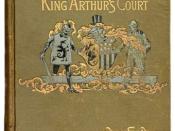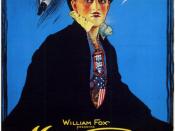Magic vs. Technology
A Connecticut Yankee in King Arthur's Court by Mark Twain met with mixed reviews when it was published in 1889. The British especially took offense at the novel, feeling that it may damage their history and culture and dishonor the ideals of King Arthur and his Round Table. Others called it a triumph, full of genuine insight and sensitivity to social injustices throughout the ages. Many critics call attention to the cynical ending as evidence of Twain's own disappointment with the promises of technology and progress as a result of his financial difficulties. Nonetheless, in the novel Hank is a firm supporter of the technology who opposes passionately to the idea of superstition and false magic, proposed by Merlin.
In the book, Merlin represents superstition, fake magic and the old order while Hank is the supporter of "the magic of science," of civilization and progress. Their constant rivalry is the personification of the larger social project that Hank is trying to achieve in making England into an industrialized nation.
Hank establishes schools, telephones, monetary industry, newspaper, trade, etc. In the establishment of the newspaper Hank sees the beginning of the new era of communication. Even though in the beginning he has to cope with the non vivid writing style of his students of journalism, as time passes this "dryness" of the text disappears. Therefore the newspaper becomes the most popular way of communicating for the middle century people.
Thus using nineteenth century knowledge, Hank wins the title "The Boss", because no one else is as good as him in creating "magic" (technology) and in governing the "new" inventions. These are the reasons why the people adore the Connecticut Yankee and even come to see him as if he is an extraordinary miracle to which they must humble.


